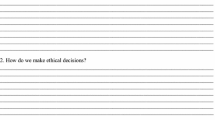Abstract
The first Ethics Bowl competition was established in the 1990s by Dr. Robert Ladenson of the Illinois Institute of Technology to help students reason through ethical challenges they will face in their personal and professional lives, and help them develop responsibilities as citizens of a democracy. Since then, the Ethics Bowl format and its pedagogical goals have been adapted to many other academic disciplines and a variety of student and professional populations. Our aim was to quantify the growth of the Ethics Bowl concept by enumerating and describing extant Ethics Bowl programs, outlining both pedagogical goals and operational aspects. Using respondent-driven sampling, we identified 20 Ethics Bowl programs across the globe, reaching tens of thousands of participants annually, and an additional two programs preparing to launch in the near future. We conclude by making recommendations for pedagogical and operational dimensions of the programs.
Similar content being viewed by others
References
Association for Practical and Professional Ethics (APPE). 2020. Association for Practical and Professional Ethics Intercollegiate Ethics Bowl History and Overview: Updated April 2020. Available at https://www.appe-ethics.org/assets/docs/IEB%20Overview%20and%20History_2020.pdf
Barsky, A.E. 2019. Ethics and values in social work: An integrated approach for a comprehensive curriculum. New York: Oxford University Press.
Byrd, M., and B.A. Varga. 2018. The manifestation of Campbell’s law: Consequences of eliminating of social studies from the curriculum. The Social Studies 109 (1): 27–33.
De Souza-Hart, J.A., and D. Ho. 2014. The gen-ethics bowl – An in-class activity combining genetics and bioethics. The Journal of Microbiology & Biology Education 15 (2): 238–239.
Ladenson, R.F. 2001. The educational significance of the ethics bowl. Teaching Ethics 1 (1): 63–78.
Ladenson, R. 2012. Civility as a democratic civic virtue. In Civility in politics and education, ed. D.S. Mower and W.L. Robison. New York: Routledge.
Ladenson, R.F. 2018. Ethics bowl: An approach to implementing ethics across the curriculum. In Ethics across the curriculum—Pedagogical perspectives, ed. E. Englehardt and M. Pritchard. UK: Springer.
Lee, L.M. 2018. Ethical competencies for public health personnel. Ethics, Medicine & Public Health 4: 21–26.
Merrick, A., R. Green, T. Cunningham, L. Eisenberg, and D.M. Hester. 2016. Introducing the medical ethics bowl. Cambridge Quarterly of Heathcare Ethics 25 (1): 141–149.
Merrick, A., R. Green, T. Cunningham, L. Eisenberg, and D.M. Hester. 2017. The curricular ethics bowl: Answering pedagogical challenges. Teaching Ethics 17 (2): 151–165.
Meyer, T. 2012. The intercollegiate ethics bowl: An active learning experience. Marketing Education Review 22 (3): 215–224.
National Society of Professional Engineers (NSPE). 2013. Professional Engineering Body of Knowledge. Available at: https://www.nspe.org/sites/default/files/resources/nspe-body-of-knowledge.pdf (accessed August 23, 2020).
Presidential Commission for the Study of Bioethical Issues (PCSBI). 2016. Bioethics for every generation: Deliberation and education in health, science, and technology. Washington DC: PCSBI.
Acknowledgements
The author thanks members of the 2019-2020 APPE Board of Directors and the APPE IEB® Council for their contributions to the list of Ethics Bowl programs. The author expresses deep gratitude to Bob Ladenson for his indelible mark on the field of ethics pedagogy.
Availability of data and material
Not applicable.
Author information
Authors and Affiliations
Corresponding author
Ethics declarations
Conflicts of interest/Competing interests
None.
Ethics approval
Not applicable.
Consent to participate
Not applicable.
Consent for publication
Not applicable.
Code availability
Not applicable.
Additional information
Publisher’s note
Springer Nature remains neutral with regard to jurisdictional claims in published maps and institutional affiliations.
Rights and permissions
About this article
Cite this article
Lee, L.M. The growth of Ethics Bowls: a pedagogical tool to develop moral reasoning in a complex world. International Journal of Ethics Education 6, 141–148 (2021). https://doi.org/10.1007/s40889-020-00111-1
Accepted:
Published:
Issue Date:
DOI: https://doi.org/10.1007/s40889-020-00111-1



